|
|
|
Sort Order |
|
|
|
Items / Page
|
|
|
|
|
|
|
| Srl | Item |
| 1 |
ID:
099833
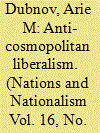

|
|
|
|
|
| Publication |
2010.
|
| Summary/Abstract |
The debate between contemporary cosmopolitans and advocates of nationalism is hardly new. Nevertheless, much of it is based on the erroneous assumption that cosmopolitanism should be seen as an outgrowth of liberalism, and that both should be considered as the complete conceptual opposites of nationalism. In this article I focus on two of the post-war Jewish anglophile intellectuals who took part in this debate during the Cold War years: the Oxonian liberal philosopher Sir Isaiah Berlin (1909-97) and the Israeli historian Jacob L. Talmon (1916-80). I use their examples to argue that the dividing line between cosmopolitans and advocates of nationalism should not be regarded as signifying the distinction between liberals and anti-liberals; in fact, this debate also took place within the camp of the liberal thinkers themselves. I divide my discussion into three parts. Firstly, I examine Berlin's and Talmon's positions within the post-war anti-totalitarian discourse, which came to be known as 'liberalism of fear'. Secondly, I show how a sense of Jewish identity, combined with deep Zionist convictions, induced both thinkers to divorce anti-nationalist cosmopolitanism - which they regarded as a hollow, illusionary ideal associated with impossible assimilationist yearnings - from the liberal idea. I conclude by suggesting that, although neither man had ever developed a systematic theoretical framework to deal with the complex interactions between ethno-nationalism, liberal individualism and multiculturalism, Berlin's vision of pluralism provides the foundations for building such a theory, in which liberalism and nationalism become complementary rather than conflicting notions.
|
|
|
|
|
|
|
|
|
|
|
|
|
|
|
|
| 2 |
ID:
086139
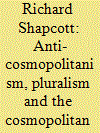

|
|
|
|
|
| Publication |
2008.
|
| Summary/Abstract |
For anti-cosmopolitan critics, cosmopolitanism is equated with the universalisation of a particular, liberal, account of justice and is therefore problematic for a number of reasons. The liberal principle 'do no harm' principle - and the cosmopolitan principle of humanitarianism, can be used to correct the depiction of cosmopolitanism as hostile to 'pluralism', to identify the universalism that is latent or undeveloped in much 'anti-cosmopolitanism', and to identify further means of reconciling these positions. A cosmopolitan harm principle argues that the absence of a universal conception of justice should not provide an obstacle to the recognition of an obligation to limit transboundary harms.
|
|
|
|
|
|
|
|
|
|
|
|
|
|
|
|
| 3 |
ID:
111040
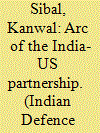

|
|
|
| 4 |
ID:
115225
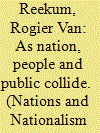

|
|
|
|
|
| Publication |
2012.
|
| Summary/Abstract |
In recent decades, Dutchness has become an intensely debated issue in Dutch public sphere. The article problematises the labelling of nations and nationalisms that occurs in public and academic understandings of these developments. Craig Calhoun's concept of discursive formation is argued to be more fruitful for understanding the recent contestations over Dutchness. Yet Calhoun's theory is itself in need of elaboration. Whereas Calhoun proposes to focus on the extent to which nations are constructed as publics of highly differentiated members, it is precisely this image that is central to an exclusionary discourse of Dutchness and enables the exclusion of cultural others from the Dutch imaginary. By analysing the enactment of Dutchness through discourses on citizenship, the surprising congruence of pluralism and exclusion in the Dutch context is explored.
|
|
|
|
|
|
|
|
|
|
|
|
|
|
|
|
| 5 |
ID:
077214
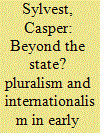

|
|
|
|
|
| Publication |
2007.
|
| Summary/Abstract |
The relationship between pluralism and internationalism is an interesting historical theme on the borderline between international relations and political theory. Intuitively the two ideologies seem to enjoy a close relationship, and at an abstract level they were both concerned with achieving political order with a minimum of central authority. However, the historical and theoretical interconnections between pluralism and (liberal) internationalism in Britain remain largely unexplored. This article attempts to fi ll this lacuna in intellectual history. Although both took shape within the confines of the same progressive intellectual agenda, the article strikes a cautious note about establishing too close a link between pluralism and internationalism, especially in the years following the Great War. This sceptical conclusion reflects not only the different preoccupations and changing nature of both pluralism and internationalism in the opening decades of the twentieth century, but also their complex theoretical relationship.
|
|
|
|
|
|
|
|
|
|
|
|
|
|
|
|
| 6 |
ID:
103542
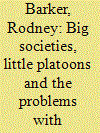

|
|
|
|
|
| Publication |
2011.
|
| Summary/Abstract |
Conservative talk of a 'big society' is one more mutation of the unstable family of pluralism. It is a large family, with both benign and progressive left wing members and rogue right wing black sheep. The progressive contribution has been substantial, but pluralism is not a homogeneous ideology or set of policies, and the single word conceals stresses and irreconcilable oppositions in theory and practice. An examination of this variety gives clues to the latest contributions, and to some of the more regressive uses to which pluralism can be put. The left needs both to insist on its own major contribution to progressive pluralism, and to beware of wolves in pluralist clothing.
|
|
|
|
|
|
|
|
|
|
|
|
|
|
|
|
| 7 |
ID:
104697
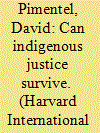

|
|
|
| 8 |
ID:
095455
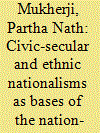

|
|
|
|
|
| Publication |
2010.
|
| Summary/Abstract |
The dominant Eurocentric paradigm of the nation and the nation-state was premised on western historical experience that was indigenous to the west but claimed universality for the rest. Many post-colonial countries, particularly those that went through national liberation struggles, like India and China, with multi-ethnic mobilisations, established sovereign states. The nationalist leaders claimed the unity of nationhood for their culturally diverse countries (states), with their millennia-deep civilisational identity, compelling a new discourse on the untenability of the classic Eurocentric paradigm. The second development witnessed the inevitable cultural heterogenisation of the western countries premised on the expansion of the (immigrant) labour market through an ever-enveloping regime of economic liberalisation and world trade. The catharsis of the invasion of cheaper labour from culturally diverse countries, often native-displacing, resulted in western countries attempting to accommodate the emerging changing reality in the context of mono-cultural nations through the concept and policy of multiculturalism. In spite of this, western countries have been witness to intercultural violence, racial discrimination and threats of home grown terrorism. The paper seeks to distinguish between 'pluralism' and 'multiculturalism' and argues for a reformulation of the concept of the nation-state that will have greater applicability across states.
|
|
|
|
|
|
|
|
|
|
|
|
|
|
|
|
| 9 |
ID:
155156
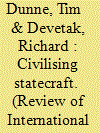

|
|
|
|
|
| Summary/Abstract |
In this contribution to the forum marking the publication of Andrew Linklater’s remarkable book on Violence and Civilization in the Western States-Systems we first locate the book in the context of Linklater’s overarching intellectual journey. While best known for his contribution to a critical international theory, it is through his engagement with Martin Wight’s comparative sociology of states-systems that Linklater found resonances with the work of process sociologist, Norbert Elias. Integrating Wight’s insights into the states-system with Elias’s insights into civilising processes, Violence and Civilization presents a high-level theoretical synthesis with the aim of historically tracing restraints on violence. The article identifies a tension between the cosmopolitan philosophical history which underpins the argument of the book, and which has underpinned all Linklater’s previous works, and the ‘Utrecht Enlightenment’ that offers a conception of ‘civilized statecraft’ at odds with a universal conception of morality and justice. The article then examines Linklater’s argument about the ‘global civilizing process’ as it applies to post-Second World War efforts to build greater institutional capability to protect peoples from harm. It is argued that Linklater over-estimates the extent to which solidarism has civilised international society, and that the extension of state responsibilities and development of civilised statecraft owe more to pluralism than solidarism.
|
|
|
|
|
|
|
|
|
|
|
|
|
|
|
|
| 10 |
ID:
152348
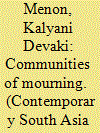

|
|
|
|
|
| Summary/Abstract |
In this article, I examine how Old Delhi’s Shias construct community across religious and sectarian lines to live with others in contemporary India. I focus on the Islamic month of Muharram, when Shias ritually mourn the death of Imam Husain and his companions at the Battle of Karbala. Often a period marked by sectarian violence and tension in South Asia, here I focus on everyday attempts to bridge difference, diffuse tensions, and enable broader understandings of community amongst Old Delhi’s Muslims, and between Muslims and Hindus. Drawing on ethnographic fieldwork conducted amongst diverse groups of Muslims residing in Old Delhi, I examine how religious practices and narratives during and immediately after Muharram, provide an arena for new ways of positioning Shias in Old Delhi, and in India today. I argue that Shii rituals and narratives during Muharram, while marking religious and sectarian distinctions, simultaneously enable forms of identity that challenge exclusionary constructions of community and nation and allow Old Delhi’s diverse communities to live with difference in contemporary India.
|
|
|
|
|
|
|
|
|
|
|
|
|
|
|
|
| 11 |
ID:
086453
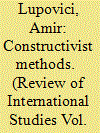

|
|
|
|
|
| Publication |
2009.
|
| Summary/Abstract |
My aim in this article is to improve the methodology of the modernist constructivist approach and to provide a more coherent, rigid, and systematic constructivist framework for research. I do this by combining the methods of process tracing, discourse analysis, and counterfactuals. In addition, I aim to provide clearer methodological criteria for the evaluation of constructivist research by modifying some of the positivist criteria and adding the criterion of contextual validity. I assert that a more coherent methodology will strengthen and improve constructivist study and may contribute to better communication between constructivist and positivist scholars.
|
|
|
|
|
|
|
|
|
|
|
|
|
|
|
|
| 12 |
ID:
089500
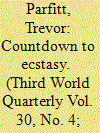

|
|
|
|
|
| Publication |
2009.
|
| Summary/Abstract |
This paper examines the antinomies posed by a consideration of development as eschatology. Development is generally conceived as a grand narrative with humanity progressing inevitably to a redemptive goal, whether this be revolution or Rostovian consumerism. It is eschatological in structure. This opens development theory up to critique. Grand narratives premised on an end of history are open to criticism as utopian and exclusory through setting a limit-they conceive of a redemptive ending of time, but repress those excluded from the vision. However, this eschatological structure may also have a function in the shape of the Derridian conception of 'the promise'. This concept refers to a need to posit a closure that incorporates a redemptive, Messianic moment, which impels us to pursue the promise of that moment of development. Thus, the eschatological structure of development incorporates a risk of utopianism/exclusory violence-but we need the Messianic moment in order to conceptualise the goal that drives us to strive for progress.
|
|
|
|
|
|
|
|
|
|
|
|
|
|
|
|
| 13 |
ID:
108237
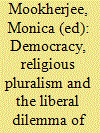

|
|
|
|
|
| Publication |
London, Springer, 2011.
|
| Description |
xiv, 187p.
|
| Standard Number |
9789048190164, hbk
|
|
|
|
|
|
|
|
|
|
|
|
Copies: C:1/I:0,R:0,Q:0
Circulation
| Accession# | Call# | Current Location | Status | Policy | Location |
| 056324 | 318.8/MOO 056324 | Main | On Shelf | General | |
|
|
|
|
| 14 |
ID:
161545
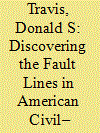

|
|
|
|
|
| Summary/Abstract |
This essay is in response to Thomas Crosbie and Meredith Kleykamp’s article that investigates relationships between what they consider to be three fault lines in the American military profession: ethical lapses, expertise, and identity. As they explore the literature to contemplate how professionalism might help to prevent ethical lapses, they also seek to reveal relationships between lapses, military expertise, and identity. To enhance the relevance of their research, it is recommended that they examine ethical lapses more broadly. Their core subject is American civil–military relations, which is a complex, contentious, and often ambiguous topic. They can mitigate the ambiguity by developing a clear problem statement and a set of research assumptions. In addition, because not all lapses are treated the same, they can be categorized to identify more serious lapses, which will allow for a focused examination of institutional responses to the lapses. Also, integrating other academic approaches such as political science and history into their research will improve the theoretical and explanatory power of their investigation. Adopting these and other aspects of inquiry will support the testing of their six hypotheses and improve our understanding of the military profession.
|
|
|
|
|
|
|
|
|
|
|
|
|
|
|
|
| 15 |
ID:
137601
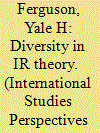

|
|
|
|
|
| Summary/Abstract |
Rather than dead or even moribund, International Relations (IR) theory is most certainly “alive,” although of course exactly how “well” remains a matter for debate. This article explains that each of the traditional and more recent “schools” of theory has its important strengths and serious weaknesses. Some theories are more appropriately applied to particular problems than to others. Analysts need to be conversant with a wide range of theories so they can recognize them when they are being employed (even only implicitly) and also use them as a toolkit when developing a research subject or explanations for patterns observed. Viewing some subjects simultaneously from more than one theoretical perspective often enhances understanding.
|
|
|
|
|
|
|
|
|
|
|
|
|
|
|
|
| 16 |
ID:
126997
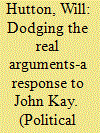

|
|
|
| 17 |
ID:
119992
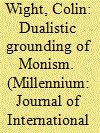

|
|
|
|
|
| Publication |
2013.
|
| Summary/Abstract |
The Conduct of Inquiry is a tour de force that carefully unpacks the idea of 'inquiry' in International Relations and reconstructs debates surrounding this issue in a way Jackson believes will foster genuine debate and, potentially at least, facilitate progress in the discipline. However, it is not without its problems. In this contribution to the forum, I present three challenges to Jackson's position. Firstly, I challenge the validity of the monism-dualism split that he believes underpins all approaches to the field. Secondly, I take issue with Jackson's account of science and methodology. Thirdly, I briefly highlight some problems with Jackson's account of pluralism and argue that it fails to provide the conditions of possibility for 'engagement' that Jackson is so committed to.
|
|
|
|
|
|
|
|
|
|
|
|
|
|
|
|
| 18 |
ID:
057781
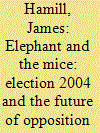

|
|
|
| 19 |
ID:
006233
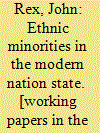

|
|
|
|
|
| Publication |
London, macmillan Press, 1996.
|
| Description |
x, 258p.
|
| Standard Number |
0333650190
|
|
|
|
|
|
|
|
|
|
|
|
Copies: C:1/I:0,R:0,Q:0
Circulation
| Accession# | Call# | Current Location | Status | Policy | Location |
| 037935 | 305.8/REX 037935 | Main | On Shelf | General | |
|
|
|
|
| 20 |
ID:
080816
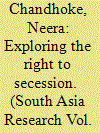

|
|
|
|
|
| Publication |
2008.
|
| Summary/Abstract |
One of the most intractable problems confronting South Asian states and societies has been the presence of secessionist movements and insistent demands for a state of one's own. Though societies and states tend to react violently when faced with such demands, many serious issues are embedded in secessionist demands, as well as in the responses to these demands, above all issues of justice and injustice. The present article seeks to trace out the key issues involved in demands for secession, exploring reasons for why and when such demands arise in the first place. Examined within the wider context of international law, specific scenarios in South Asia are considered to propel a debate about whether secession can be argued to be a right, and in what circumstances. It is proposed that the concept of secession has, in effect, to be extricated from narrow agendas of national security, war against terror, and military strategy, and placed within the wider domain of normative political theory, which can indeed find justifications for demanding secession.
|
|
|
|
|
|
|
|
|
|
|
|
|
|
|
|
|
|
|
|
|